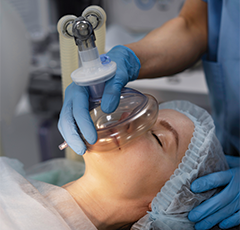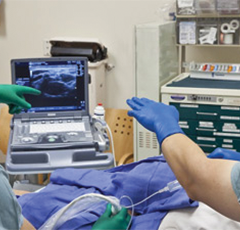Overview
Our Anesthesiology Department is committed to ensuring your comfort and safety during surgical procedures. Our skilled team of anesthesiologists and support staff provide personalized anesthesia care, using the latest techniques and state-of-the-art equipment to monitor and manage your vital functions. From preoperative assessments to postoperative recovery, we focus on making your surgical experience as smooth and pain-free as possible. Our anesthesiologists are also experts in pain management and critical care, working closely with surgeons, nurses, and other healthcare professionals to deliver comprehensive care tailored to your specific needs. Trust us to prioritize your comfort, safety, and well-being every step of the way.
TREATMENTS & PROCEDURE

Comprehensive anesthesia care to keep patients unconscious and pain-free during major surgical procedures, ensuring safety and comfort with continuous monitoring of vital functions.
General anesthesia involves administering medications to make patients unconscious and pain-free during major surgeries. It ensures the patient remains unaware and comfortable, with vital functions closely monitored throughout the procedure to ensure safety and effectiveness.

Effective pain relief for specific body areas through spinal, epidural, and nerve block techniques, allowing patients to remain awake and enhancing recovery.
Regional anesthesia numbs specific areas of the body, allowing patients to remain awake. Techniques like spinal, epidural, and nerve blocks provide effective pain relief for procedures on limbs, abdomen, and lower body, enhancing recovery and reducing overall anesthesia exposure.

Varying levels of sedation to help patients relax and minimize pain during minor surgeries, ensuring comfort while maintaining consciousness.
Sedation offers varying levels of relaxation and pain relief for minor surgeries. This technique helps patients stay calm and comfortable while maintaining consciousness, ensuring a smoother procedure with less recovery time compared to general anesthesia.

Individualized pain management plans combining medications, therapies, and interventions to address chronic pain and ensure comfortable postoperative recovery.
Our pain management services develop individualized plans to address chronic pain conditions and postoperative pain. By combining medications, therapies, and interventions, we aim to improve quality of life and facilitate faster recovery, ensuring patients remain comfortable and active.

Thorough evaluations of patients’ health to create tailored anesthesia plans, ensuring safe and effective procedures based on individual medical history and needs.
Preoperative assessments involve evaluating a patient’s health to create a tailored anesthesia plan. This includes reviewing medical history, conducting physical exams, and ordering necessary tests, ensuring the chosen anesthesia method is safe and effective for each individual’s needs.

Close monitoring and support after surgery to manage pain, address complications, and ensure safe, comfortable recovery with a focus on overall well-being.
After surgery, our team provides close monitoring and support to manage pain and address any complications related to anesthesia. This comprehensive care ensures patients recover safely and comfortably, with a focus on preventing issues and promoting overall well-being.
Comprehensive anesthesia care to keep patients unconscious and pain-free during major surgical procedures, ensuring safety and comfort with continuous monitoring of vital functions.

General anesthesia involves administering medications to make patients unconscious and pain-free during major surgeries. It ensures the patient remains unaware and comfortable, with vital functions closely monitored throughout the procedure to ensure safety and effectiveness.
Effective pain relief for specific body areas through spinal, epidural, and nerve block techniques, allowing patients to remain awake and enhancing recovery.

Regional anesthesia numbs specific areas of the body, allowing patients to remain awake. Techniques like spinal, epidural, and nerve blocks provide effective pain relief for procedures on limbs, abdomen, and lower body, enhancing recovery and reducing overall anesthesia exposure.
Varying levels of sedation to help patients relax and minimize pain during minor surgeries, ensuring comfort while maintaining consciousness.

Sedation offers varying levels of relaxation and pain relief for minor surgeries. This technique helps patients stay calm and comfortable while maintaining consciousness, ensuring a smoother procedure with less recovery time compared to general anesthesia.
Individualized pain management plans combining medications, therapies, and interventions to address chronic pain and ensure comfortable postoperative recovery.

Our pain management services develop individualized plans to address chronic pain conditions and postoperative pain. By combining medications, therapies, and interventions, we aim to improve quality of life and facilitate faster recovery, ensuring patients remain comfortable and active.
Thorough evaluations of patients’ health to create tailored anesthesia plans, ensuring safe and effective procedures based on individual medical history and needs.

Preoperative assessments involve evaluating a patient’s health to create a tailored anesthesia plan. This includes reviewing medical history, conducting physical exams, and ordering necessary tests, ensuring the chosen anesthesia method is safe and effective for each individual’s needs.
Close monitoring and support after surgery to manage pain, address complications, and ensure safe, comfortable recovery with a focus on overall well-being.

After surgery, our team provides close monitoring and support to manage pain and address any complications related to anesthesia. This comprehensive care ensures patients recover safely and comfortably, with a focus on preventing issues and promoting overall well-being.
FAQs
Anesthesia is medication used to induce temporary loss of sensation or consciousness during surgery. It works by altering nerve signals, blocking pain, and allowing surgical procedures to be performed without discomfort.
It depends on factors like the type and duration of surgery, patient health, and preferences. Anesthesiologists assess these factors to select the safest and most effective option.
Follow fasting guidelines provided by your healthcare team, disclose all medications and health conditions, and discuss any concerns with your anesthesiologist.
MAC involves administering sedatives and pain relievers to keep patients comfortable during minor surgeries or procedures while allowing them to remain responsive and cooperative.
The main types include general anesthesia (unconsciousness), regional anesthesia (numbing specific areas), and local anesthesia (numbing small areas).
Risks include allergic reactions, nausea, and rare complications like nerve damage. Side effects can vary depending on the type of anesthesia used.
Patients are monitored closely for vital signs and recovery from anesthesia effects like drowsiness or nausea. Pain management and postoperative care plans are initiated as needed.
Anesthesiologists monitor vital signs continuously, adjust anesthesia levels as needed, and use advanced equipment to ensure patient safety and comfort throughout the procedure.
Anesthesiology Doctors












